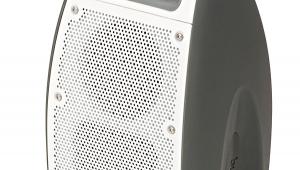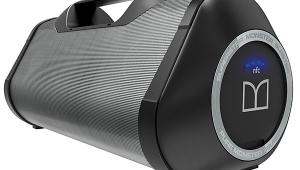Review: Cambridge SoundWorks Oontz and Oontz XL

One thing about capitalism: If you're successful, people will immediately copy what you're doing. After watching Jawbone's Jambox and Big Jambox Bluetooth speakers succeed wildly over the last year, countless companies introduced similar products. Some featured clever tweaks, some flashed more radical designs, and some sounded better. Of course, some were less expensive, too.
Cambridge SoundWorks Oontz Bluetooth speakers aren't going to win any design awards, but they might win a Best Value award. The original Oontz-an obvious Jambox competitor-costs just $49, less than a third the price of the $179 Jambox. The new Oontz XL-an obvious Big Jambox competitor-costs just $99, only 40 percent the price of the $249 Big Jambox.
Both have what's become the industry-standard configuration for compact Bluetooth speakers: two full-range drivers plus a passive radiator for deeper bass response. In the Oontz XL, though, there are actually three passive radiators: two in the front, one in the back. The other "new" feature is that the Oontz XL can charge your phone or tablet through its USB jack, although that capability is now pretty common. Like a lot of larger Bluetooth speakers, the Oontz XL charges through a standard coaxial-connector AC adapter rather than through USB. It has track forward/reverse skip buttons on top. On the Oontz, the buttons are on the side.
Performance
It's immediately obvious that the Oontz XL is not some cost-reduced, cheap little Bluetooth speaker. It plays loud enough to fill a small vacation home with sound, and even at full blast, the sound distorts only rarely and subtly.
When I did my MCMäxxx™ test, cranking Mötley Crüe's "Kickstart My Heart" up until the unit reaches maximum volume or Vince Neil's voice starts to distort, I got 95 dB at 1 meter, which is comparable to what I've measured from many of the larger, not-really-so-portable AirPlay and Bluetooth speakers. In fact, as I write this, the first pipe organ passage of Joseph Jongen's powerful and dynamic "Symphony Concertante" just played, and the Oontz XL cranked the hell out of it. No distortion. No harshness. Just satisfying sound.
I've often talked about using James Taylor's live recording of "Shower the People" as a test for ... well, almost any audio product. But with Bluetooth speakers, I usually skip to another track halfway through, partly because so many of them mangle the solo that backup singer Arnold McCuller takes at the end of the tune. McCuller's high notes often sound strained through cheap speakers, but through the Oontz XL he actually sounded smoother than Taylor. (Taylor's voice triggered what I consider the Oontz XL's one real sonic flaw, a certain tizziness and slight distortion in the treble, probably the result of a little resonance or buzz in the enclosure or one of the drivers or radiators, I would guess.)
I liked that the Oontz XL's passive radiators aren't tuned artificially low, a trick some engineers use to get deeper bass from small speakers. This kind of tuning tends to make the bass sound bloated and detached from the mids and treble. Yet the Oontz SL still has plenty of deep bass; it even handled the deep, powerful upright bass notes that open Holly Cole's "Train Song" with just a slight amount of distortion. Even many good bookshelf speakers can't do that.
So is the Oontz XL as good as the Big Jambox? Actually, in my opinion it's better. I liked the Big Jambox, but for me, its midrange was a little thin and its lower treble too emphasized, giving it a somewhat brash and edgy sound on tunes like Led Zeppelin's "Over the Hills and Far Away." On this tune, the Oontz XL sounded smoother and more natural even at full crank, capturing more fullness in Robert Plant's voice.
Compared to the Oontz...
I really just wanted to review the Oontz XL for this article, but Cambridge SoundWorks insisted on tossing in an original Oontz just so I could compare them. I wish I had a Jambox sitting around to compare the Oontz to, but I did have something in the same rough price range: Soundmatters' $219 FoxL Dash7, which is a more compact version of the Soundmatters FoxL, which is what the guts of the Jambox were based on.
When I listened to that same James Taylor cut, it was obvious that the Dash 7 is a more refined device; it had a bigger, more open, more spacious, more exciting sound. In comparison, the Oontz seemed a bit "canned" and low-res sounding. Still, though, it got close enough to the Dash 7 that the competition was more like a first-string NBA player taking on a second-string player. In other words, the Dash 7 didn't totally outclass the Oontz the way it does with most compact Bluetooth speakers.
The ultra-funky, yet ultra-cheezy title track of George Benson's The Shape of Things to Come let the Oontz show its stuff. It had enough bottom end to get the groove across, and enough top end to let the high-hat and other cymbals pass mostly unimpeded. It nicely filled my kitchen, hitting an impressive (for its size) 88 dB on the MCMäxxx test.
Speakers this compact are usually so compromised, so pushed-to-the-edge that it's hard to overlook their flaws. But with the Oontz it's hard to find them. I can never know for sure how much of a good-sounding miniature speaker is luck and how much is the result of wise voicing decisions, but the Oontz sounds to me like somebody who really knew what he was doing was involved.
Bottom Line
Both the Oontz XL and the Oontz sound better than anything else I've heard in their price class, and they can approach (and sometimes beat) the performance of competitors costing several times as much. In fact, I'd say the Oontz XL is the best speaker of its general form factor I've heard. The Oontz isn't the best I've heard in its size class, but it's easily the best value. I wouldn't have the slightest hesitation about recomending either one of these products.




























































